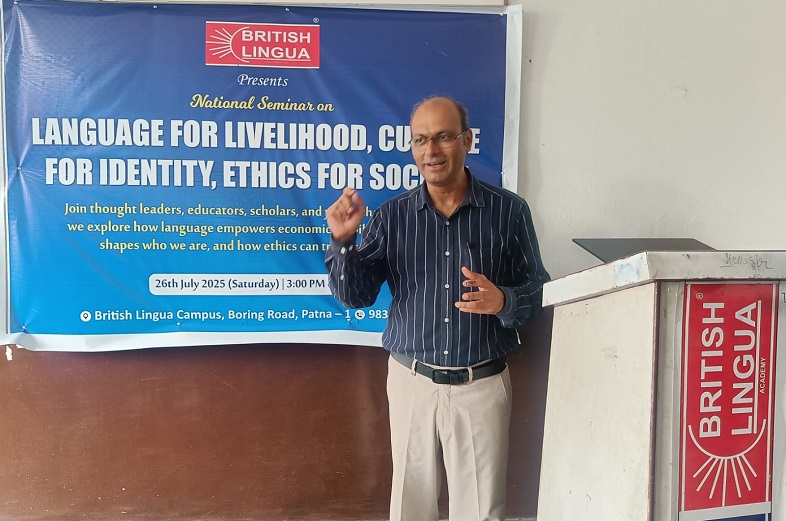
Patna, 26 July 2025:
In a series of compelling public addresses this week, Dr Birbal Jha — noted author, social entrepreneur, and Managing Director of British Lingua — laid out a transformative national vision rooted in three pillars: English for Livelihood, Culture for Identity, and Ethics for Society.
With characteristic eloquence and grassroots insight, Dr Jha called for a “conscious cultural renaissance, ethical resurgence, and linguistic empowerment” across India. His speeches, delivered to diverse audiences including students, educators, policymakers, and civil society leaders, were both motivational and policy-oriented — rich with aphorisms now echoing far beyond the podium.
English for Livelihood: Skill, Not Superiority
In his keynote titled “English for Livelihood”, Dr Jha argued that English should no longer be viewed as a colonial residue or a social marker, but rather as an empowering skill that can propel economic growth and social mobility. Drawing from his own humble beginnings in rural Bihar, he emphasized how mastering English transformed not just his life, but also the lives of thousands trained under his social initiative, British Lingua with the slogan – English for all.
“Don’t learn English to impress others — learn English to express yourself and progress in life,” Dr Jha asserted.
He cited stark employability statistics, noting that although India produces 3.5 million graduates annually, less than 25% are deemed employable due to weak communication skills, especially in English. Proposing pragmatic reforms, he called for integrating spoken English into vocational training and school curricula, particularly in rural India.
“English must be seen as a tool of empowerment, not Westernisation. It is a livelihood language that can break the chains of poverty and unemployment,” Dr Birbal declared.
Culture for Identity: Rootedness in a Globalised World
Further speaking on “Culture for Identity”, Dr Jha delved into the critical role of culture in preserving individual and collective identity. Urging Indians — particularly the youth — to embrace their linguistic, artistic, and traditional heritage, he argued that cultural confidence forms the bedrock of personal dignity and national unity. “A tree without roots cannot stand, and a society without culture loses its essence,” Dr Jha remarked.
Through the Mithilalok Foundation, Dr Jha has been actively reviving the rich cultural heritage of Mithila, including Maithili language, Madhubani art, and folk traditions. While promoting English as a global bridge, British Lingua, under his leadership, equally champions regional identity — proving that global proficiency and local pride are not mutually exclusive.
“Modernity must not come at the cost of identity. Let culture not be a relic of the past, but a living legacy for the future,” Dr Jha urged.
Ethics for Society: The Moral Foundation of Progress
Furthermore, addressing the seminar, Dr Jha addressed the moral vacuum threatening social fabric in an era of rapid technological advancement and digital dominance. Rooted in the ancient Indian concept of Dharma, he emphasized that ethics — not merely laws — must guide public life, education, governance, and business.
“A deed may be legal and still be unethical. Ethics demand a higher standard — of truthfulness, compassion, and accountability,” Dr Jha pointed out.
Citing the role of value-based education and citizen-driven reform, Dr Jha highlighted his grassroots efforts through Mithilalok Foundation in nurturing honesty, civic sense, and social responsibility. He cautioned against outsourcing morality to laws or institutions, saying real change begins within individuals. “Let ethics be our light. Let society be our shared responsibility,” Dr Jha concluded.
A Vision for a New India
Together, these speeches form a roadmap for inclusive and sustainable national progress. With Language for Livelihood, Culture for Identity, and Ethics for Society, Dr Birbal Jha’s message resonates deeply with India’s aspirations in the 21st century.
His call is not just for policy reforms, but a societal movement — one that empowers the common Indian to thrive economically, stay rooted culturally, and act ethically.
“Let us not merely teach English. Let us train for transformation. Let us not only celebrate culture. Let us live it. Let us not just preach ethics. Let us practice it,” he said.
As India stands at the crossroads of tradition and modernity, Dr Jha’s vision offers both a compass and a call to action.

